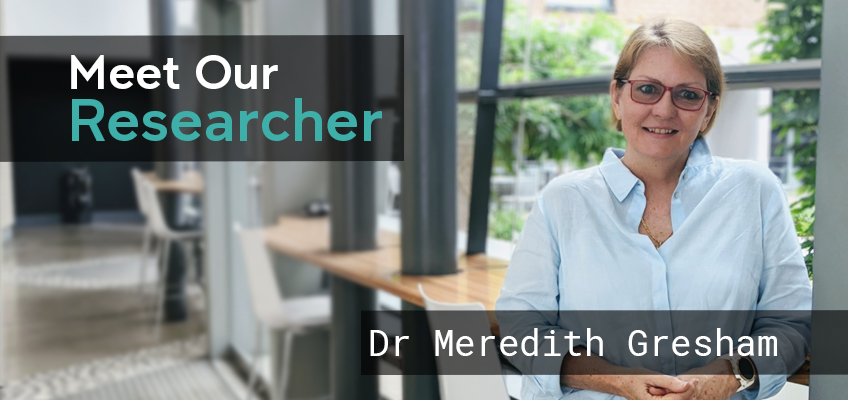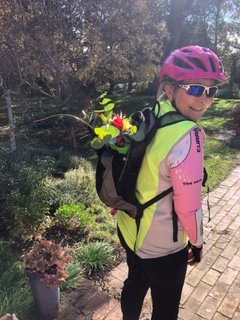26 Nov 2020

For Dr Meredith Gresham, dementia presents as a pandemic itself. Future incidence projections indicate skyrocketing levels of dementia over the next fifty years. However, there is a growing evidence base for activities and interventions which may delay the onset of dementia and improve quality of life and function after diagnosis. Dr Gresham is currently co-ordinating CHeBA’s COGNISANCE Project which aims to develop practical toolkits for people with dementia, care partners and health and social care professionals. These toolkits will facilitate better coping with the diagnosis and support afterwards.
How did you get into researching the ageing brain?
I have been involved in research in various ways throughout my whole career, though not the traditional way. As a young music student at the Queensland Conservatorium I assisted a music therapist working with a group of older people, many of whom I was to learn later had dementia. I decided to do a second degree in Occupational Therapy to combine this with my background in music. However, upon graduating I worked with CHeBA’s Co-Director, Professor Henry Brodaty, where I coordinated a project which aimed to educate the family and carers of dementia patients. This started a lifelong interest in dementia for me.
Did you experience a ‘defining moment’ which led you to this field?
It may sound frivolous, but when I was an Occupational Therapy student, we had these funky little uniforms of blue culottes and white nurses’ shoes. I swore I would never wear a pair of blue culottes after I graduated! Also, in my last year of university I had undertaken a major student research project which really fascinated me. When a research job which did not involve wearing blue culottes was advertised, I jumped at it. The position was with Professor Henry Brodaty and this was in the mid-1980s. Rather than a defining moment, it was a confluence of several small events which led me in to this field. I had an interest in older people, interest in dementia and an interest in research.

Do you have any personal interests or activities which are protective behaviours against cognitive decline?
My mum died 18 months ago a few days shy of her 102nd birthday (I was a very late baby!), and she had great cognitive health. She was still chuckling about the doctor who, some years ago in her late nineties tried to catch her out on a dementia screening test by asking “who is the prime minister?” to which she replied “Kevin Rudd” “And before that?” asked the Doctor, “Julia Gillard” was the reply. And again… “Before that?” “Kevin Rudd”. I am banking on good genes, a liberal dose of cycling and enjoyment in word puzzles, and backgammon!
What are you currently researching?
The Co-designing dementia diagnosis and post diagnostic care and support (COGNISANCE) is a five-country study across ten universities. COGNISANCE aims to develop tools to improve the diagnosis experience and post diagnostic support for people living with dementia, their care partners, as well as health and social practitioners. It really is an essential project. It is part research and part knowledge translation. Internationally, rates of diagnosis in general is poor, and diagnosis is generally made too late to institute interventions for wellbeing. What happens to many people following diagnosis is that they are told to “go home and manage as best as you can, come back and see us when you can no longer manage”, or baldly, “start looking for a good nursing home”.
It is woefully inadequate. There is a good emerging evidence base of interventions and activities that will enhance wellbeing and quality of life as well as help the person with dementia function at their best.
It is just not widely practiced. With other chronic diseases people get immediate support from the time of diagnosis to manage the disease. Dementia is still missing out. We currently have over half a million people in Australia with dementia. This number is projected to increase by the middle of the century to over one million people. People should be able to hope that they may still have a reasonable quality of life and enjoyment in life despite the diagnosis. There are ways to achieve this, and the importance of this project is getting that message out.
Why is your research important?
Dementia is a pandemic in its own right. It is just not infectious. It is also a disease primarily of older people and unfortunately older people are often stigmatised.
What do you love about working for CHeBA?
Being around passionate and committed individuals. Everybody at CHeBA is committed to improving older people’s lives and using good science to do that. People are all working different angles, different facets and different areas, but overall committed to improving lives of those living with dementia and those that provide support. There is a certain thrill in actually working where there is an opportunity to discover new things, unearth new information and develop new knowledge.
What is the ultimate hope you have for your research?
That the outcomes of this research are implemented. We are developing practical toolkits through a codesign process. That is, we are bringing together all of the people who were involved in dementia, people with dementia, care partners, health, and social care professionals. By working together, toolkits should be relevant and practical. Toolkits will ‘speak’ to the people who need them.
My biggest hope for our research is that it is widely accepted and widely implemented - not only throughout Australia but because it is an international project - throughout the world.
My greatest wish is that it provides a sense of hope for people diagnosed with dementia and their care partners. It provides health and social care practitioners with new tools and new ways of thinking about approaching and supporting people with dementia.
This interview was undertaken during the COVID-19 self-isolation period. Having been directly affected by summer bushfires, Dr Meredith Gresham found the isolation of COVID less anxiety-provoking than it may have otherwise been. However, providing water and food for native animals following the fires and a daily session playing piano is great for her wellbeing! Video calls with family and friends have kept her feeling socially connected while physically isolated.
Donations are fundamental for critical research to continue following COVID-19.
If you would like to discuss supporting Dr Gresham's work specifically, or would like information
on leaving a legacy via a Gift in your Will, please contact h.douglass@unsw.edu.au.

Dr Meredith Gresham is a Research Fellow at CHeBA co-ordinating the Co-design dementia diagnosis and post diagnostic care (COGNISANCE) Project. The project aims to improve the diagnostic experience of dementia patients, their families, and care partners by developing a practical toolkit to enhance coping strategies. Dr Gresham obtained a Dip Arts Mus from the Queensland Conservatorium, a Bachelor of Occupational Therapy from Cumberland College (now Sydney University), and her PhD at Sydney University.
